Do you feel overwhelmed when it comes to tracking and monitoring your SEO marketing strategy? Do you wish there was some simple way to measure SEO performance?
Then, you are in the right place!
Indeed, constantly measuring SEO performance can make a big difference in traffic and rankings. But, navigating through the sea of SEO metrics and Key Performance Indicators (KPIs) can be overwhelming, especially for beginners.
That’s why I'm thrilled to welcome you to read this blog post.
In this comprehensive guide, we make the process easy for you to understand. We will provide you with clear, actionable insights to elevate your website's performance.
No, we won’t overwhelm you with countless SEO metrics. We will only focus on the key indicators that genuinely define your website's performance.
Additionally, we’ll reveal some powerful but free SEO measuring tools that can transform your SEO strategy. From keyword ranking monitoring tools to competitor SEO analysis tools, we'll leave no stone unturned in your quest for SEO excellence.
And because SEO performance tracking goes far beyond the numbers, we’ll also equip you with the knowledge and expertise to interpret these metrics, so you can transform the raw data into actionable strategies that elevate your website's performance.
So, if you are ready for this, then let’s dive in!
What is SEO Performance Tracking?
In the highly competitive online marketing world, businesses and web masters rely on different SEO strategies to enhance their visibility and ranking in search engine results pages (SERPs). The primary goal is to increase organic (non-paid) traffic to your site and ultimately, attract potential customers, and high value leads.
However, because search engine algorithms are constantly evolving, SEO requires consistent monitoring, analysis, and adaptation to maintain competitiveness. This is where SEO performance tracking comes into play.
So, what exactly is SEO performance tracking?
It is the process of measuring and evaluating the effectiveness of your SEO Optimization efforts. It involves analyzing various metrics and key performance indicators (KPIs) to help you understand the effectiveness of your SEO strategies so you can make informed decisions.
Why Is Monitoring SEO Performance Important?
There are a number of reasons why you should make regular monitoring of your website’s SEO performance a part of your SEO strategy. Like Peter Drucker rightly put it, “You can't improve what you don't measure.”

Basically, here are some reasons monitoring your SEO performance is important:
- Effectiveness Assessment: Measuring SEO performance allows you to gauge how well your SEO efforts are working. It helps determine whether the strategies you have implemented are positively impacting your website's visibility, rankings, and organic traffic. Without measurement, you won't know if your SEO initiatives are successful or need adjustments.
- ROI Evaluation: SEO efforts often require time, resources, and sometimes financial investments. By measuring SEO performance, you can calculate the return on investment (ROI) for your SEO activities. Knowing the ROI helps justify the expenses and prioritize SEO in your overall marketing and business strategies.
- Identify Strengths and Weaknesses: Analyzing SEO performance data allows you to identify the strengths of your SEO approach, enabling you to replicate successful strategies. Moreover, it helps pinpoint weaknesses or areas that need improvement, allowing you to focus on addressing those aspects and optimizing your SEO tactics.
- Data-Driven Decision Making: Making decisions based on data is crucial in the digital landscape. SEO performance metrics provide objective and quantifiable information, enabling you to make data-driven decisions rather than relying on guesswork or assumptions.
- Competitive Analysis: Measuring SEO performance enables you to compare your website's performance with that of your competitors. Understanding how your site stacks up against the competition helps identify areas where you can gain a competitive advantage and stand out in the search results.
- Identify Trends and Changes: SEO is not a static field; search engine algorithms, user behavior, and market trends evolve over time. Monitoring SEO performance helps you stay on top of these changes, allowing you to adapt and adjust your strategies accordingly.
- Goal Tracking: SEO is often aligned with specific business goals, such as increasing sales, generating leads, or enhancing brand visibility. By measuring SEO performance, you can track progress toward achieving these goals and modify your strategies if necessary.
- Optimization Opportunities: SEO performance data uncovers opportunities for improvement. Whether it's optimizing underperforming pages, targeting new keywords, or improving user experience, the data guides you in prioritizing and implementing the necessary changes.
- Justifying Efforts to Stakeholders: For businesses and organizations with multiple stakeholders, SEO performance data provides tangible evidence of the impact of SEO initiatives. It can help communicate the value of SEO to executives, clients, or investors and justify continued support for SEO efforts.
Recommended: How to Optimize Content for SEO Using Rank Math (In 7 Easy Steps)
Top 9 SEO Performance Metrics You Should Track
To evaluate your SEO performance, you need a set of well-defined SEO performance metrics and Key Performance Indicators (KPIs). These metrics and KPIs act as beacons, offering valuable insights into your website's progress and guiding your SEO strategies with precision. By continually refining your SEO efforts based on your set KPIs, you can optimize your online presence, attract more organic traffic, and achieve your business objectives.
While there are hundreds of SEO metrics that you can track to measure your SEO performance, there are only a few that are really important or relevant for your business. Here are 9 key metrics you should track:
- Keyword Rankings: Monitoring the positions of target keywords in search engine results over time. Improved rankings for relevant keywords indicate a positive SEO performance.
- Organic Traffic: This is the lifeblood of SEO. Organic traffic represents the number of visitors who find your website through search engine results. Monitoring organic traffic helps gauge the effectiveness of your SEO efforts in attracting relevant audiences. An increase in organic traffic suggests successful SEO efforts.
- Click-Through Rate (CTR): CTR measures the percentage of users who click on your website's link in search results after seeing it. A higher CTR indicates that your content and meta tags are compelling and relevant to users.
- Bounce Rate: This is the percentage of visitors who leave the website after viewing only one page. A lower bounce rate indicates that users are finding valuable content and engaging with the website.
- Conversion Rate: The ultimate measure of SEO success, the conversion rate tracks the percentage of visitors who take a desired action, such as making a purchase or filling out a form. A higher conversion rate indicates that your SEO efforts are not only attracting traffic but also converting it into tangible results.
- Backlink Quality and Quantity: The quality and quantity of backlinks pointing to your website are crucial indicators of your website's authority and credibility. Monitoring backlink acquisition helps in evaluating your off-page SEO efforts.
- Page Load Speed: Website speed directly impacts user experience and search engine rankings. Faster-loading pages improve user satisfaction and contribute positively to SEO performance. You should track and constantly optimize your site to improve the load speed.
- Indexed Pages: Verifying the number of pages on the website that search engines have indexed. A higher indexation rate indicates that search engines are effectively crawling and understanding the website's content.
- Engagement Metrics: Monitoring user engagement metrics such as time spent on site, page views per session, and social media shares. Higher engagement signals that users find the content valuable and relevant.
Related: The Ultimate Guide to Keyword Research in SEO (For Maximum Website Visibility)
Setting Up Your SEO Performance Tracking System
To effectively measure and analyze SEO performance, it's crucial that you have a robust tracking system in place. Here's a step-by-step guide to get started:
Step 1: Define Your Objectives
Identify your website's primary SEO objectives, such as increasing organic traffic, improving keyword rankings, or enhancing user engagement. Align your KPIs with these objectives to ensure they directly contribute to your SEO goals.
Step 2: Select Relevant KPIs
Choose the most relevant KPIs from the list provided above or customize them based on your specific needs. Each KPI should have a clear definition and be measurable over time.
Step 3: Set Target Values
For each KPI, establish target values that represent your desired performance level. These targets act as benchmarks and help you measure progress towards your goals.
Step 4: Determine Measurement Frequency
Decide on the frequency of measuring and updating your KPIs. Some metrics may require daily monitoring, while others can be assessed on a weekly or monthly basis.
Step 5: Decide on Your Reporting and Analysis Tools
Various SEO tools are available to simplify tracking and analysis of your KPIs. Some popular options include: Google Analytics, Google Search Console and Ahrefs. SEO-specific tools like Rank Math and SEMrush are also invaluable for data collection and analysis.
Step 6: Monitor, Analyze, and Adapt
Regularly monitor your KPIs and analyze the data to identify trends, strengths, and weaknesses. Use the insights gained to adapt your SEO strategies and optimize your website's performance continually.
Best Free SEO Tools for Measuring SEO Performance
Incorporating the right SEO measurement tools into your digital marketing arsenal is crucial for improving your website's SEO performance. These tools provide valuable data and analysis to fine-tune your SEO strategies. If effectively used, these tools will greatly enhance your overall SEO strategy. Below are some of the top free SEO measurement tools we’ll found to be invaluable for measuring SEO performance.
Related: 10 Must-Have Content Marketing Tools for Online Business Growth
1. Google Search Console
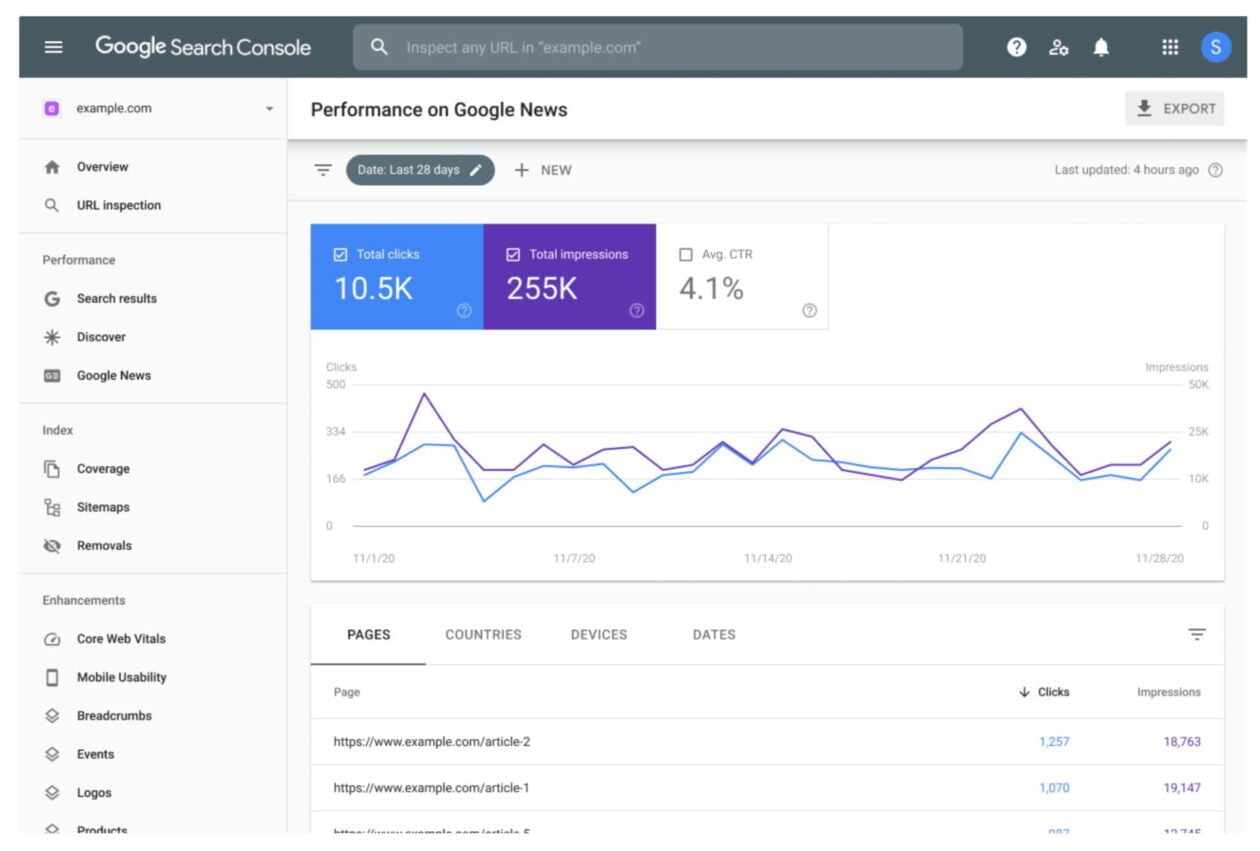
Google Search Console: Google Search Console is an essential tool for any website owner or SEO practitioner. It allows you to monitor your site's performance in Google search results. With this free tool, you can track keyword rankings, view organic search traffic, identify crawl errors, and gain valuable insights into how Google perceives your website. Google Search Console provides actionable data to enhance your website's search visibility and improve its overall performance.
Key Features and Capabilities:
- Search Performance Report: Unearth valuable data on impressions, clicks, average CTR (Click-Through Rate), and keyword rankings. Dive deep into search queries to understand how users discover your website.
- Index Coverage Report: Identify indexing errors, explore pages indexed, and ensure search engines can crawl and access your website effortlessly.
- Sitemap Submission: Submit your XML sitemap to Google, ensuring your web pages are promptly indexed and included in search results.
Tip for Effective Use: Regularly monitor the Search Performance report to identify top-performing keywords and pages. Optimize content and meta tags for these keywords to enhance their visibility and attract more organic traffic.
2. Google Analytics

While not exclusively an SEO tool, Google Analytics is an indispensable resource for understanding your website's traffic and user behavior. By analyzing organic search traffic and user engagement metrics, you can evaluate the success of your SEO efforts. This free tool provides detailed information about your audience, popular landing pages, and conversions, helping you refine your SEO strategy and optimize your content for better results.
Key Features and Capabilities:
- Audience Overview: Delve into audience demographics, interests, and behavior to gain invaluable insights into your website's visitors.
- Behavior Flow: Visualize how users navigate your website, identifying popular entry and exit points to optimize the user journey.
- Goal Tracking: Set up and monitor website goals, such as form submissions or purchases, to measure the success of your conversion strategies.
Tip for Effective Use: Set up custom dashboards and reports in Google Analytics to focus on the metrics most relevant to your business objectives. This helps you quickly access and analyze the data that matters most to your website's performance.
3. Ubersuggest
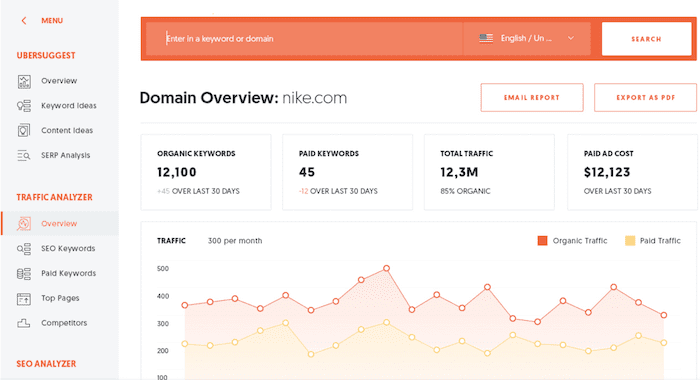
Ubersuggest is a powerful freemium tool that offers valuable keyword research and SEO analysis features. With Ubersuggest, you can explore keyword ideas, analyze competitors' top-performing pages, and track your rankings over time. The tool provides essential SEO metrics such as keyword difficulty, search volume, and cost-per-click (CPC) data, enabling you to prioritize your SEO efforts effectively.
Key Features and Capabilities:
- Keyword Analysis: Discover keyword search volume, SEO difficulty, and competitive insights to identify high-potential keywords for your content.
- Content Ideas: Uncover content ideas that resonate with your target audience, based on popular topics and trending searches.
- Backlink Analysis: Explore your competitors' backlinks, identify authoritative sources, and strategize your link-building endeavors.
Tip for Effective Use: Leverage Ubersuggest's “Content Ideas” feature to create content that not only aligns with popular topics but also fulfills user search intent. Addressing user needs ensures your content becomes a valuable resource, increasing the likelihood of earning backlinks and social shares.
4. Moz Link Explorer
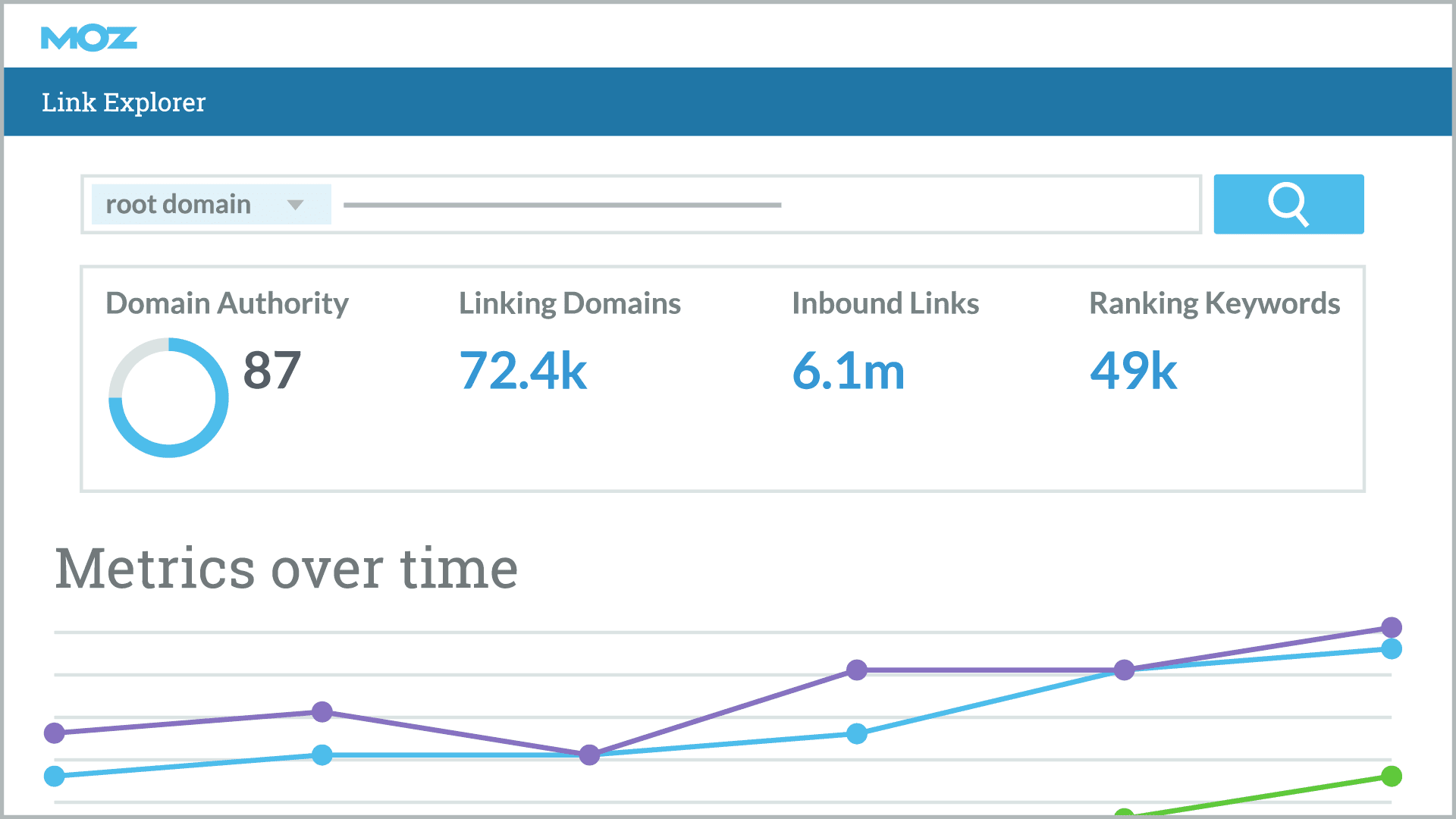
Backlinks play a crucial role in SEO, and Moz Link Explorer helps you analyze your website's backlink profile. This free tool allows you to monitor your domain authority, view top-performing pages, and identify potential link-building opportunities. By understanding your link profile, you can focus on building high-quality backlinks to improve your website's authority and search engine rankings.
Key Features and Capabilities:
- Link Analysis: Analyze the quantity, quality, and relevance of backlinks pointing to your website, uncovering opportunities for link building.
- Domain Authority (DA) and Page Authority (PA): Measure the strength and authority of your website and individual pages, essential for gauging your competitive position.
- Spam Score: Identify and disavow toxic backlinks that could harm your website's reputation.
Tip for Effective Use: Regularly monitor your website's DA and PA to track improvements in authority. Focus on building high-quality, relevant backlinks from reputable sources to boost your website's credibility in the eyes of search engines.
5. SEMrush
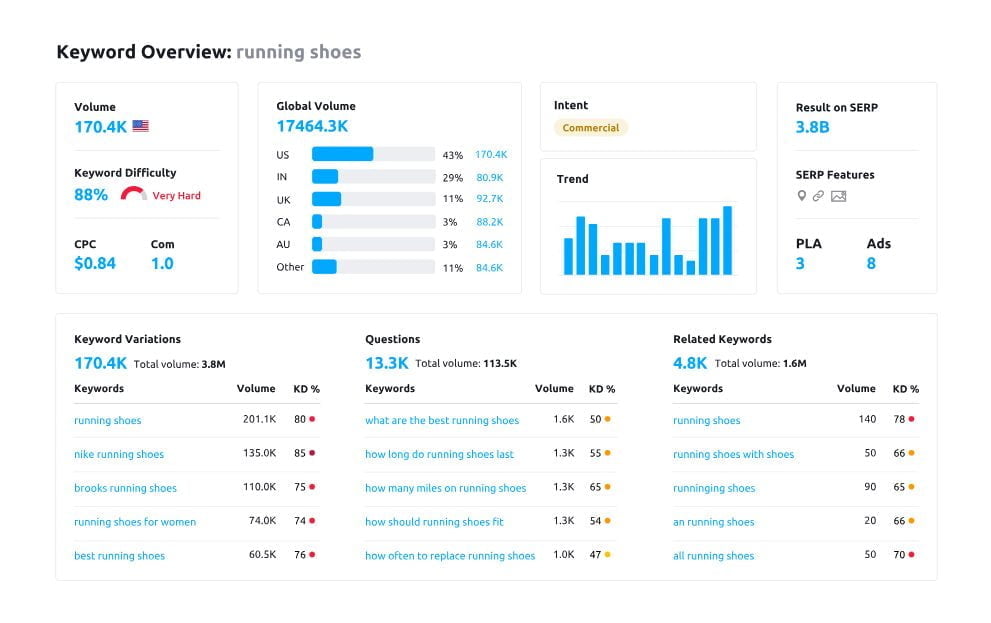
SEMrush offers a limited free version that provides access to essential SEO data, including keyword research, traffic analytics, and competitive analysis. It's a great tool for gaining insights into your website's performance and improving your SEO strategy.
Key Features and Capabilities:
- Keyword Research: Uncover profitable keywords, analyze their trends, and identify your competitors' top-ranking keywords.
- Competitor Analysis: Evaluate your competitors' online strategies, backlink profiles, and top-performing content to gain a competitive edge.
- Site Audit: Conduct in-depth website audits to identify and rectify technical issues that may hinder your website's performance.
- Position Tracking: Monitor your keyword rankings and visibility over time, helping you measure the impact of your SEO efforts.
Tip for Effective Use: Use SEMrush's “Keyword Gap” tool to identify keywords your competitors rank for, but you don't. Optimize your content for these keywords to narrow the gap and increase your chances of ranking higher in search results.
6. Ahrefs Backlink Checker
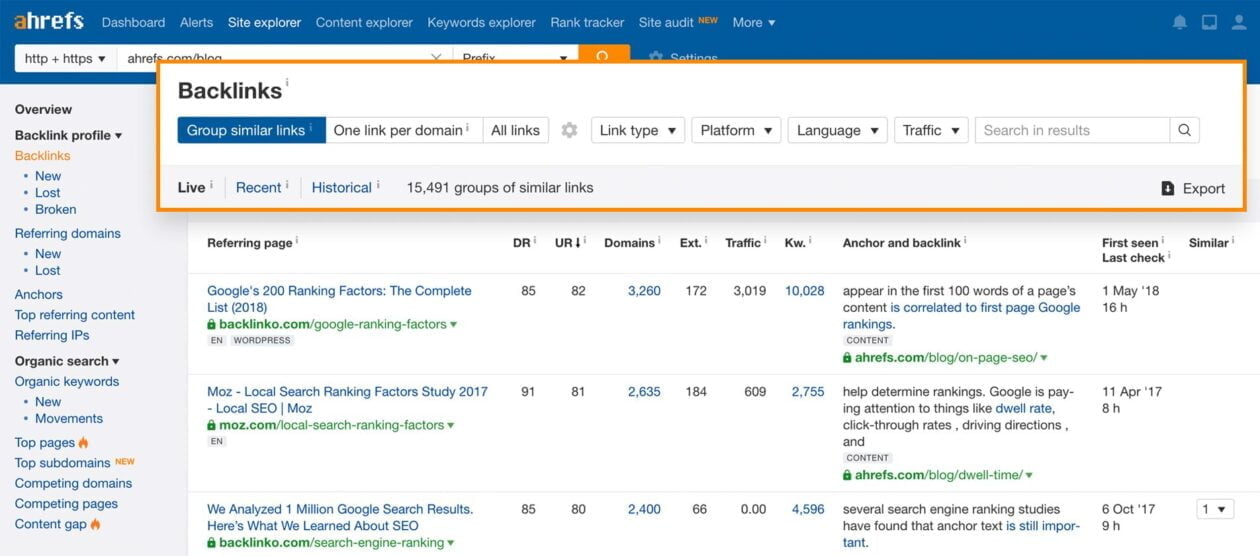
Ahrefs Backlink Checker is designed to help website owners, marketers, and SEO professionals analyze the backlink profiles of their websites. The free backlink checker that provides a snapshot of the top 100 backlinks to any website or URL.
Key Features and Capabilities:
- Backlink Analysis: The tool provides in-depth analysis of backlinks, including the ability to view the number of referring domains, backlink types (dofollow, nofollow), anchor text distribution, and the authority of linking domains.
- Competitor Research: Ahrefs allows users to analyze the backlink profiles of competitors, enabling them to identify potential link-building opportunities and understand their competitors' link-building strategies.
- Backlink Monitoring: Users can track the growth or decline of their backlink profile over time, receiving notifications for newly acquired or lost backlinks. This feature helps in understanding the effectiveness of link-building efforts.
- Link Building Opportunities: Ahrefs suggests link-building opportunities based on the existing backlink profile and industry-specific insights, simplifying the process of acquiring quality backlinks.
- Historical Data: Ahrefs provides historical backlink data, allowing users to analyze the growth and changes in their backlink profile over time.
Tip for Effective Use: Focus on the quality, relevance, and diversity of backlinks. Instead of solely aiming for a large number of backlinks, prioritize acquiring links from authoritative domains that are relevant to your website's niche or content.
7. Screaming Frog SEO Spider
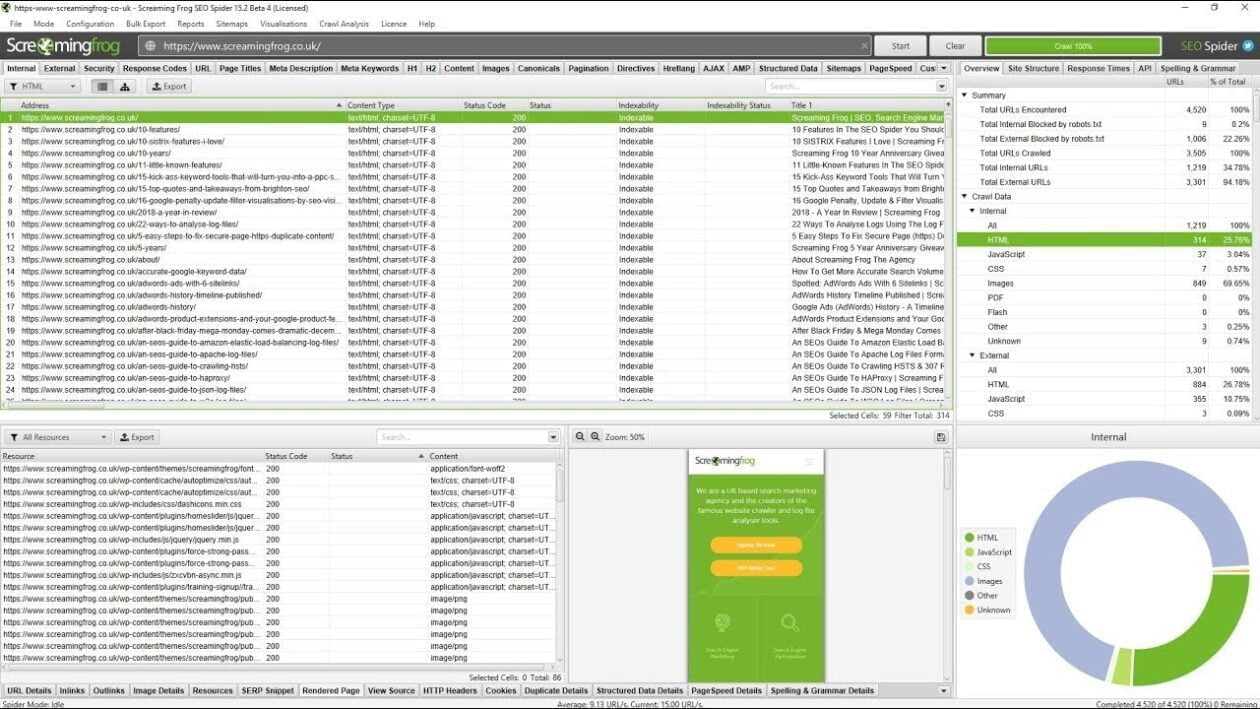
Screaming Frog SEO Spider is a website crawler and SEO auditing tool that assists website owners, SEO professionals, and digital marketers in analyzing and optimizing websites for better search engine visibility. It is widely used for on-page SEO analysis and technical website auditing.
Key Features and Capabilities:
- Website Crawling: The SEO Spider crawls websites, much like search engine bots, to collect data on URLs, page titles, meta descriptions, headings, images, and other on-page elements. It provides a comprehensive overview of the website's structure and content.
- SEO Analysis: The tool analyzes on-page SEO elements and identifies issues such as missing meta tags, duplicate content, broken links, and non-indexable pages. It helps users uncover potential SEO problems that can impact search engine rankings.
- XML Sitemap Generation: SEO Spider can generate XML sitemaps, which are essential for search engines to discover and index web pages efficiently.
- Website Visualization: The tool offers a visual representation of the website's structure, allowing users to understand the hierarchy of pages and their relationships.
- Custom Search and Filter: The tool allows users to create custom filters to sort and focus on specific SEO elements, making it easier to identify and address issues.
Tip for Effective Use: When using Screaming Frog SEO Spider, make sure to adjust the crawl settings appropriately. Crawling larger sites in one go can be resource-intensive and time-consuming. Instead, consider using “configurations” to limit the crawl to specific sections or directories of the website. This will help you focus on critical areas and gather relevant data without overwhelming your computer's resources.
How to Effectively Leverage SEO Measurement Tools
While the SEO measurement tools we've explored above offer a wealth of data and insights, harnessing their potential requires a strategic approach. Here are some invaluable tips to make the most of these tools:
- Align with Your Objectives: Define your SEO goals and choose the tools that align with your specific objectives. Tailor your strategies to target relevant keywords, improve user experience, and enhance your website's authority.
- Integrate Tools for Holistic Insights: Combine data from different tools to gain a comprehensive view of your website's performance. Google Analytics, Google Search Console, and SEO-specific tools like Ubersuggest and SEMrush complement each other, providing deeper insights.
- Benchmark and Measure Progress: Regularly benchmark your website's performance against your competitors and industry benchmarks. Monitor key metrics over time to track progress and refine your SEO strategies accordingly.
- Stay Informed and Adapt: The digital landscape is ever-changing, and SEO trends evolve rapidly. Stay updated with industry trends and adapt your strategies to stay ahead of the curve.
Common SEO Measurement Pitfalls to Avoid
When measuring SEO performance, it's crucial to be aware of and avoid common pitfalls that can lead to inaccurate insights and misguided strategies. Here are some pitfalls to watch out for:
- Focusing Solely on Rankings: While keyword rankings are essential, they are not the sole indicator of SEO success. Overemphasizing rankings can lead to neglecting other crucial metrics that contribute to overall website performance.
- Ignoring User Experience: SEO isn't just about pleasing search engines; it's about providing a seamless and enjoyable experience for users. Overlooking user experience can result in high bounce rates and low conversion rates, ultimately impacting rankings.
- Not Setting Clear Objectives: Without well-defined objectives, measuring SEO performance becomes aimless. Establish clear goals and KPIs aligned with your overall business objectives to measure success accurately.
- Neglecting Technical SEO: Technical aspects, such as website speed, mobile-friendliness, and crawlability, are fundamental to SEO success. Ignoring technical SEO can hinder search engine visibility and rankings.
- Relying on Vanity Metrics: Vanity metrics, such as total website traffic and social media followers, may look impressive but often lack real insights into SEO performance. Focus on metrics that directly impact your business goals and bottom line. For example, click-through rate (CTR), and conversions generated from social media.
Tips for Continuous Improvement and Growth
SEO is an ever-evolving discipline, and continuous improvement is the key to staying ahead. Here are some useful tips that will help greatly to foster growth and success:
- Content Optimization: Regularly update and optimize your content based on performance data and user feedback. Fresh and relevant content boosts SEO performance and keeps users engaged.
- Stay Updated on SEO Trends: Keep yourself informed about the latest SEO trends, algorithm updates, and industry best practices. Adapting to changes in the SEO landscape ensures your strategies remain effective.
- Link Building Strategies: Invest in high-quality link-building strategies to build authority and credibility. High-authority backlinks signal to search engines that your website is a reliable source of information.
- Local SEO Optimization: If your business caters to a local audience, optimize for local SEO to attract relevant traffic and potential customers in your area.
- Monitor and Adjust KPIs: As your website and business evolve, revisit your SEO KPIs regularly. Adjust them based on new objectives and changing business needs to ensure they remain relevant.
Related: How to Optimize Content for SEO Using Rank Math (In 7 Easy Steps)
Measure SEO Performance: FAQs
What are KPIs for SEO performance?
KPIs (Key Performance Indicators) for SEO performance are specific metrics used to measure the success of your SEO efforts. Some common SEO KPIs include organic traffic, keyword rankings, conversion rate, bounce rate, backlink quality and quantity, click-through rate (CTR), and page load speed. These KPIs provide valuable insights into your website's search engine visibility, user experience, and overall SEO performance.
Can Google Analytics track SEO?
Yes, Google Analytics is a powerful tool that can track various aspects of SEO performance. It provides valuable data on organic search traffic, user behavior, top-performing keywords, and conversion rates. By integrating Google Analytics with Google Search Console, you can access even more in-depth SEO data and track how your website is performing in search engine results.
How can I track SEO for free?
You can track SEO for free using various tools and platforms that offer limited but valuable insights. Some free tools for tracking SEO include Google Analytics, Google Search Console, Rank Math SEO and Ubersuggest. Remember that while free tools offer valuable data, investing in premium SEO tools can provide more in-depth analysis and help
How often should I track SEO performance?
It is essential to regularly track your SEO performance to assess the impact of your optimization efforts and make informed decisions. While the frequency may vary based on factors such as your website's size and industry, a general recommendation is to conduct monthly reviews. Tracking on a monthly basis allows you to observe trends and identify changes in key metrics over time. However, during the initial stages of implementing SEO strategies or after significant changes to your website, tracking more frequently can provide valuable insights for prompt adjustments.
Conclusion
There you have it, everything you need to track and measure your SEO performance. We hope equipped with this knowledge, you will be able to boost your search engine rankings for more organic traffic and improved user engagement.
Key Takeaways:
- Measuring SEO performance is essential for understanding the impact of your strategies and ensuring success.
- Focus on key metrics like keyword rankings, organic traffic, CTR, conversion rate, backlink quality, and page load speed.
- Align KPIs with your website's objectives to track progress and make data-driven decisions.
- Utilize free SEO tools like Google Search Console, Google Analytics, Ubersuggest, Moz Link Explorer, SEMrush, and Screaming Frog SEO Spider.
- Avoid common pitfalls, such as solely focusing on rankings and neglecting user experience.
- Continuously optimize content, stay updated on SEO trends, and prioritize high-quality link building.
- Your website's potential is limitless; embrace the data-driven journey to SEO success and watch your online presence soar.
So, what do you think of this post on how to measure SEO performance? Share your thoughts with us in the comments below.








[…] Related: How to Measure SEO Performance Like a Pro (Even if You’re Just a Beginner) […]